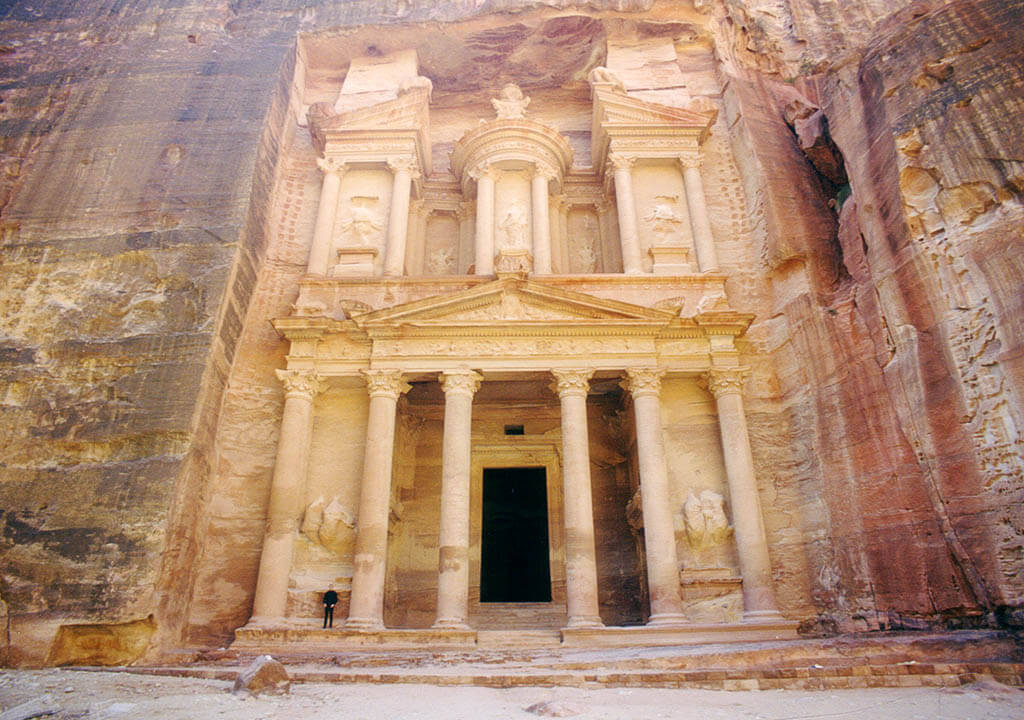Jordan, an Arab nation on the east bank of the Jordan River, is defined by ancient monuments, nature reserves, and seaside resorts. It’s home to the famed archaeological site of Petra, the Nabatean capital dating to around 300 B.C. Set in a narrow valley with tombs, temples, and monuments carved into the surrounding pink sandstone cliffs, Petra earns its nickname, the “Rose City.”
The Jordanian industrial sector consists mainly of manufacturing, extractive industries, and electricity and water. These sectors are linked backward and forward with sectors such as transportation, insurance, and trade. The industrial sector is a high contributor to Jordan’s GDP as it contributed approximately 24% in 2017, employing more than 240,000 people, most of them Jordanians, in some 18,000 industrial facilities across the Kingdom. Jordan’s main exports are apparel, potash, phosphates, fruits, and vegetables, medical supplies, pharmaceutical products, and fertilizers were the main export products and goods. Countries mostly exported to include the United States, Saudi Arabia, Iraq, India, United Arab Emirates, and Indonesia. The main imports were transportation equipment, spare parts, petroleum products, crude oil, textile yarn, fabrics, and make-up articles, primarily imported from countries such as Saudi Arabia, China, the United States, and Italy.
The importance of the industrial sector can be traced to Jordan’s strong competitiveness for industrial investors. Jordan’s location within the Middle East and North Africa (MENA) region, supported by the variety of free trade agreements (FTAs), offering access to 1.5 billion customers across more than 160 countries, enables the country to be a strategic trade route to many of its neighboring countries and regions. Continuous efforts have been made to ensure easy access to Jordanian products to international markets. The latest has been the agreement between Jordan and the EU with regards to the Relaxation of Rules of Origin over the next ten years as of July 2016. The agreement covers most industrial products, which are expected to have greater access to the EU market, such as textiles, apparel, electrical and home appliances, chemical products, plastic products, and furniture.
Dead Sea is considered as the most important natural resources in Jordan, because it contains important minerals in the salts and Mud, with the high properties for the skin, body and hair care, and treats many dermatologists, where many international companies have used it as active ingredients in their cosmetics and skin care products. The exportation in this industrial sector plays an important role in the economy of Jordan and its development and growth. As it contributes to the provision of the foreign exchange to finance the imports and the domestic market expansion, which in turn expand the employment and production, and increase the GDP, while at the corporate level the exportation helps in achieving the goals of increasing profits and sales volume, and the disposal of surplus product.
The concentration of Dead Sea salt is 10 times more than any other seas. The Salt of the Dead Sea has contained natural healing elements. The Dead Sea salt recognized to heal mutually the body and the mind. Furthermore, a bath in Dead Sea salt could help to relax. As the following, some of the greatest benefits of Dead Sea salt:
- Calms down the nervous system
- Increases the circulation of blood
- Helps prevent the onset of heart disease
- Prevents baldness
- Reduces stress
- Reduces inflammation of the joints
- Skin care benefits of Dead Sea salts
- Repair of damaged tissue
- Helps strengthen the bones
- Relaxation and sleep benefits
- Boost up energy
Lately, the Dead Sea salt has progressed as one of the extreme sources of raw materials for skincare products. The exclusive composition of Dead Sea salt benefits the penetration of facial skin more deeply without causing any irritation. This enriches the facial skin with essential minerals, quickly absorbing it in an improved tone and natural splendor.
Keywords: Jordan, Petra, Rose city, industry, exportation, strong competitiveness, international agreements, The Dead Sea.
Author: Dr. Tareq Tamimi
